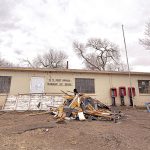
Nez proposes new version of failed ARPA bill
WINDOW ROCK
In his state of the nation address on Monday, President Jonathan Nez said a new bill being drafted to allocate the remaining $1.1 billion in ARPA funds, to be sponsored by Delegate Mark Freeland, is an attempt at compromise with the Navajo Nation Council over how to spend the money.
This comes after the amended former ARPA bill (No. 257-21) failed to pass Council earlier this month.
A draft high-level plan and budget for the legislation shared with Council by Freeland and sent to the Navajo Times, indicates the new bill includes changes to fix “previously identified” concerns, and incorporates “previously approved” expenditure plans from the previous bill.
“We ask the 24th Navajo Nation Council to approve American Rescue Plan Act funding as soon as possible to support these basic services for our people,” said Nez. “Construction season is now here and our people need homes, bathroom additions, and all of the basic necessities that we are well aware of.”
Freeland told the Navajo Times he worked alone with the president’s office to develop the bill, which has yet to be finalized.
“I just got the plan and proceeded forth,” said Freeland. “It’s a compromise. It’s trying to meet everyone in the middle.”
Nez said the Nation’s “technical experts” developed the revised plan that includes basic infrastructure, public safety, rural addressing, senior centers, wellness centers, detox centers, assisted living facilities, community warehouses, transitional housing, economic development, housing and additional money to ensure that all eligible Hardship Assistance applicants receive the help they need.
“Each of these expenditure plans have been reviewed and deemed eligible by the Department of Justice for American Rescue Plan Act funding,” he said. “We need to approve this plan so that we can meet the federal deadline, ensure accountability and compliance with federal guidelines, and improve the quality of life for our people.”
Proposed spending
The new plan proposes allocating $745,000 to each of the 110 chapters at a total cost of $81.95 million to address their “highest priority needs” at a local level.
The funding amount per chapter is below the $750,000 audit threshold under the Single Audit Act, said Nez, and chapters will need to develop expenditure plans.
The proposal also includes an additional $120,000 for Hardship Assistance because more people are applying for payments than the budgeted 345,000 applicants funded at a total of $557,000.
It is estimated that there are currently about 411,000 tribal members and the additional funds will be needed to process additional checks.
“The Office of the Controller has now issued over 300,000 Hardship Assistance checks to our people,” said Nez. “However, we understand that there are many inquiries from applicants and we ask our people to understand that there are still thousands of checks that are still being processed at this time.”
The proposal would also return $42.2 million of the $180 million allocated for ARPA project administration to the executive branch and $5 million of the $20 million to the legislative branch back to the budget to help offset the additional hardship monies, said Nez.
Also included in the proposed bill are $164.9 million for “critical COVID services,” with $35 million for rural addressing, $5 million for cybersecurity, $79.5 million for the Navajo Department of Health programs, and $45.5 million for the Division of Economic Development initiatives.
Last but not least, the plan includes $750.6 million for infrastructure projects, including $215 million for water/wastewater systems, $120 million for broadband, $100 million for electricity, $165.6 million for housing, and $150 million for bathroom additions.
However, no updated project listing has been provided for the bulk infrastructure categories beyond the high-level numbers.
Delegate Amber Crotty said not receiving that detail continues to create a bottleneck and is further delaying projects.
“I have made several requests for a budget breakdown,” said Crotty. “In particular, which projects submitted to the DCD portal have been submitted for DOJ review for ARPA eligibility?”
Freeland suggested that the Navajo Times should ask the executive branch for that list, but the president’s office did not respond to that request.
‘Delegates concerns ignored’
Some delegates were taken aback that Freeland had worked independently with the president’s office on a new plan and budget without consulting the rest of the Council.
“I was not aware that President Nez was working with certain delegates,” said Shiprock Delegate Eugenia Charles-Newton. “President Nez did not state that on the record today.
“As a delegate representing the largest community on the Navajo Nation all I can say is, ‘Good ‘Ole Boys Club,’” she said.
Delegate Carl Slater said that nothing in the new proposal “reflects compromise” and eliminates legislative involvement in authorizing chapter or regional projects.
“Speaking on behalf of those of us who tried to ask for true compromise, this is insulting to read… again, how is moving farther away from the consensus a compromise?” he asked.
Slater suggested no good-faith negotiations can happen with delegate concerns being “purposefully ignored.”
“This doubles down on the original 257-21 and then takes more funding away from our communities to go to economic development projects and increased funding for other programs,” he said. “It appears these meager expenditure plans will be handled administratively, so the executive branch will have exclusive control over their handling.”
‘Council split too’
However, Freeland told Navajo Times that any delegate is free to drop new legislation to spend the funds, which has always been the case.
“I’m trying to be the mediator,” he said. “I’m trying to get this money out – that’s all I want to do.”
Freeland said no other delegates were willing to sponsor the revised OPVP bill with him so he decided to move it forward on his own.
“The Council is split too, so keep that in mind,” he said.
Nez said in finalizing the bill, it’s important the Council also consider other available sources of funding such as the Indian Health Service SDS listing that includes $543 million for major water projects, $55 for broadband development through the National Telecommunications and Information Administration, NTUA rental assistance, the Biden Infrastructure Law, and FEMA reimbursements.
“As we move forward, we, as leaders elected by our people, must look many years ahead and think of our generations to come,” said Nez. “With uncertainties in revenue and the federal budget, we must continue to work together to advocate at all levels of government.”
He said his administration also remains focused on addressing Navajo Nation policy changes to streamline the right-of-way clearance processes and expedite the construction of new roads and water, power, and broadband development.
“Together, we face many difficult challenges, but it is incumbent upon us to work together to serve the common good, to put differences aside, and address the issues that create barriers to progress and create real change.”
As a public service, the Navajo Times is making all coverage of the coronavirus pandemic fully available on its website. Please support the Times by subscribing.
How to protect yourself and others.
Why masks work. Which masks are best.
Resources for coronavirus assistance








 Highway 264,
Highway 264, I-40, WB @ Winslow
I-40, WB @ Winslow